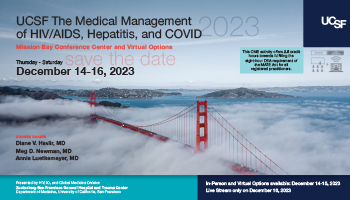UCSF The Medical Management of HIV/AIDS, Hepatitis and COVID
In-Person and Virtual Options available: December 14-15, 2023
Fully Virtual on December 16, 2023 for all attendees
Course #MDM24K02
Presented by HIV, ID, and Global Medicine Division
Zuckerberg San Francisco General Hospital and Trauma Center
Department of Medicine, University of California, San Francisco
Course Description
This course provides the active, intermediate-to-advanced clinician with a comprehensive review of the science of HIV, Hepatitis, and COVID, as well as an update on the application of HIV, Hepatitis, and COVID therapies, and management and prevention of STIs including MPox.
For ambitious new clinicians who want a challenge, we still offer our New Clinicians Track (NCT). This track provides five additional lectures that cover antiretroviral therapy (ART), basic HIV pharmacology, ART resistance, IRIS, and HIV related opportunistic infections. All course lecturers are leading clinicians and teachers who are dedicated to teaching in their areas of expertise.
The COVID pandemic has further amplified existing health disparities as well as the vulnerability of our patients, making the need for up-to-date information about HIV/AIDS, Hepatitis, and COVID essential for providing high quality care. Current treatment options for acute COVID and understanding the science and management of Long COVID will be addressed.
All lectures will be cased-based with at least 2-4 ARS questions per session. Question and answer time as well as faculty panels are weaved into each conference day. The panels are designed with ARS questions so that you can privately test your individual knowledge against the experts throughout the conference.
* Days 1 and 2 will be offered both on Zoom and in-person. Day 3 will be on Zoom only.
Target Audience
This course is designed for Primary Care practitioners, (Internal Medicine, Family Practice, Physician Assistant's, Nurse Practitioners and RN's), Infectious Disease specialists and Pharmacists, who care for adult and geriatric HIV patients, in rural and/or urban settings, are our essential target audience. Successful care of HIV patients involves dealing with complications of many end organs and systems (GI, CV, Renal, Neurology, Dermatology, OB-GYN, Urgent Care and ER) so the course is germane to those specialties as well. Given the notable impact of hepatic disease (viral hepatitis and fatty liver), MPox and COVID on HIV, these content areas are a particular focus of our course.
The identified practice gaps relate to these learners and to their scope of professional activities. There is a core knowledge base, competencies and performances required to skillfully care for those infected with HIV/AIDS or those co-infected with COVID-19 and/or MPox.
![]() Onsite and Remote Learning Options:
Onsite and Remote Learning Options:
The course will be offered as a live conference. Registrants have the option to attend in person or to tune in remotely via zoom live stream during programming hours (Pacific Time). Login instructions along with the digital syllabus will be shared with attendees before the meeting. Included in your registration fee is access to the course recordings on demand after the conference and for 30 days after the course. You must tune in to the live conference (in person or remotely) to claim CME.
Objectives
An attendee completing this course will be able to improve skills and strategies to:
- Diagnose, treat, and prevent important conditions in HIV medicine and HIV medicine subspecialties, for improved patient outcomes;
- Apply in practice the latest treatment guidelines and recommendations for the prevention of HIV transmission and the appropriate use of PrEP;
- Apply new recommendations for initiating and timely switching of antiretroviral combinations in appropriate patients;
- Identify new developments and apply treatment recommendations in HIV related dermatologic, metabolic, cardiovascular, renal, disease as well as reproductive medicine and addiction medicine;
- Apply new recommendations for the treatment of HBV, cirrhosis, NASH and NAFLD.
- Align practice patterns more with current evidence and guidelines for treating STI’s, COVID, Mpox and HIV.
- Apply in practice the latest treatment guidelines and recommendations for the prevention of COVID transmission
- Apply new recommendations for appropriate treatment of acute COVID-19 and Long COVID
